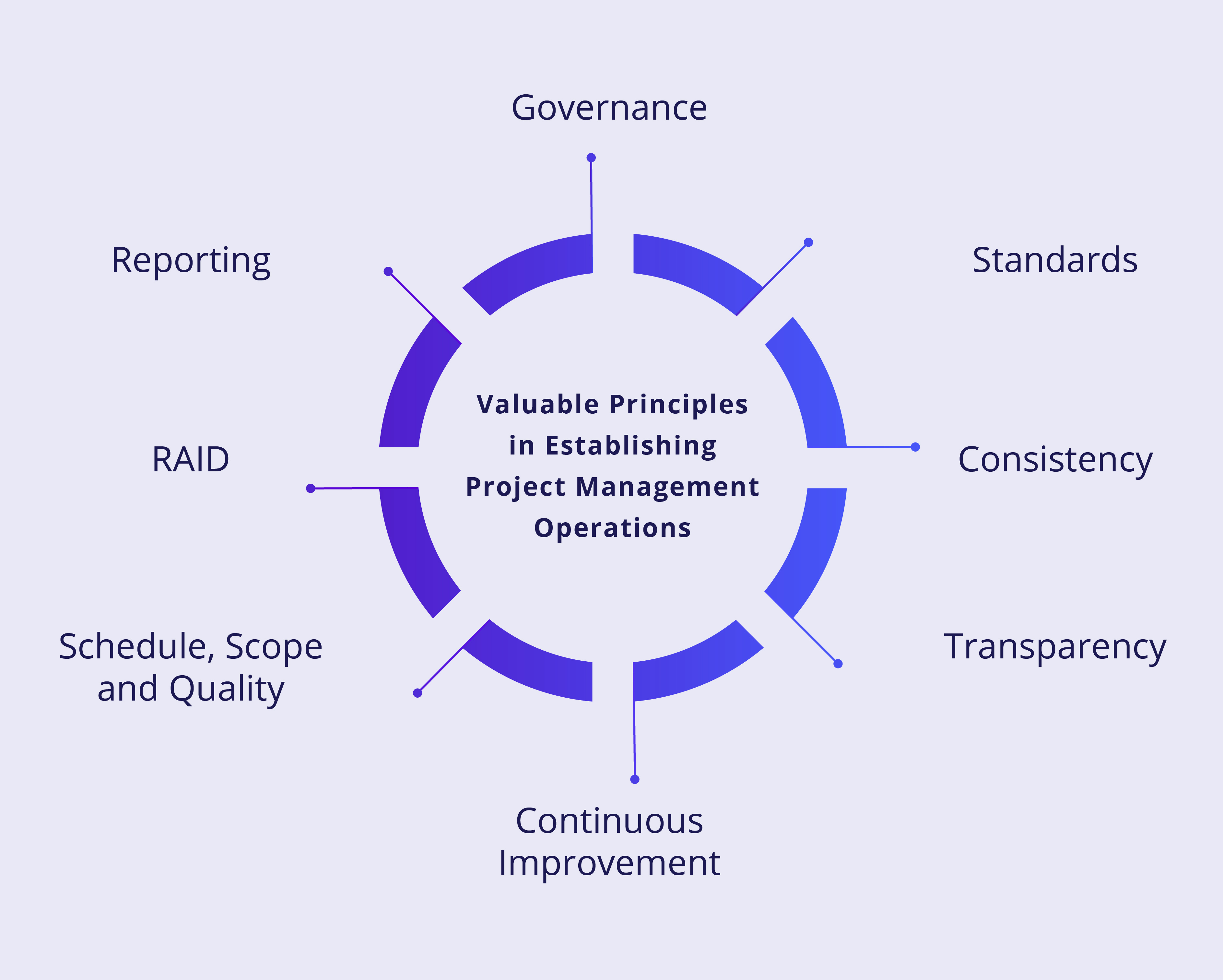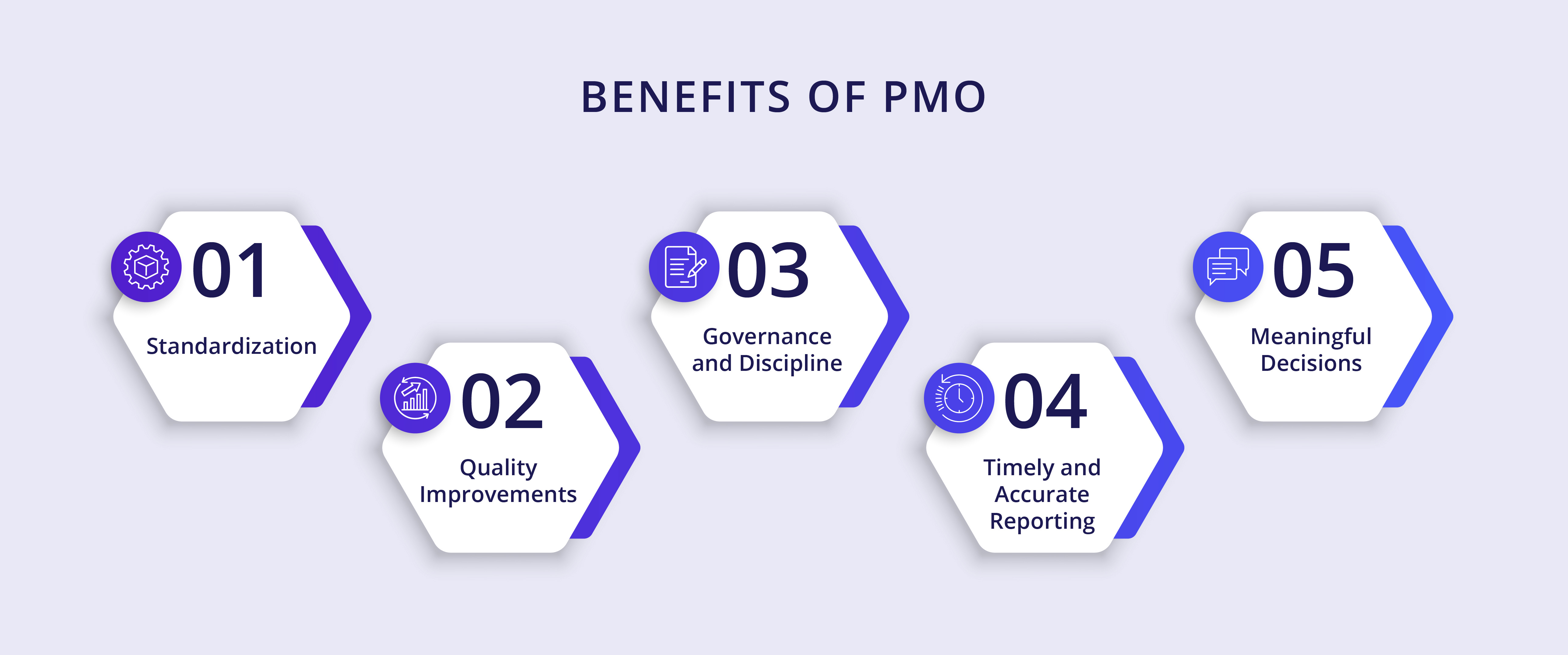
Resources
Establishing Project Management Operations at a Company
8 Valuable Principles of Establishing Project Management Processes

That’s when we established a Project Management Office - to build a strong foundation for the future.
Let me take you through the process that has been working for us, starting with the basics.
What is a Project Management Office (PMO)?
A PMO’s responsibility is to ensure a centralized and coordinated management of projects.
To simplify, the PMO is given the responsibility to manage projects within its scope and define a set of management standards. This allows everyone involved to achieve success and visibility as final outcomes.
How? Through standardization and good practice, of course.
For instance, at Anchanto, the PMO defines and executes various processes which involve communication management, change request management, schedule management, RAID management, etc. to improve project deliveries.
Although there are different types of PMOs, like Supportive, Controlling, Directive, etc., you can select the one that fits your business needs. At Anchanto, we have zeroed in on a Directive PMO.
A Directive PMO provides a project management framework by establishing processes, templates, standards, SOPs, checklists, etc. as well as some appropriate tools for processes. It also provides and develops resources, like professional Project Managers to manage ongoing projects
Valuable Principles in Establishing Project Management Office
The main objective of a Project Management Office is to define frameworks, templates, and principles that help establish an organization-wide standard approach to projects and project deliveries.
At Anchanto, the PMO does this by working together with internal and external stakeholders using predefined or new processes to ensure successful outcomes; on-time delivery with high quality.
We need to build a strong team, but before building a team, you need to have some rules in place. Here are some crucial principles that work as the building blocks of a strong Project Management Office:
1. Governance
Governance is a framework for making decisions regarding projects and products. It involves prioritization, approvals, escalations, and discipline, etc. in the projects.
2. Reporting
With set processes in place, the PMO must establish accurate and timely reporting to all stakeholders (internal and external). Reporting is about sharing the status of a project with identified stakeholders. The frequency of this is predefined.
3. RAID
R - Risks
A - Assumptions
I - Issues
D - Dependencies
RAID is about identifying, capturing, and managing risks, assumptions, issues, and dependencies. Many companies focus only on risk management, but it’s very important to identify and communicate the assumptions and dependencies as well.
The PMO must engage in RAID management and ensure that risks, assumptions, and dependencies, do not result in issues.

4. Schedule, Scope, and Quality
Detailed and efficient planning, schedule, and quality management is a crucial part of an effective PMO. When projects are planned with a clear vision, achieving them becomes easier and overall success improves.
5. Standards
Standards refer to the common framework for project management functions. Establishing certain processes and functionalities can enable better deliveries, help manage expectations, and achieve results in a structured way.
6. Consistency
Consistency is a framework to ensure all projects are populating reports, documents, plans, etc to the same level using common standards. With this process in place, transparency and accuracy can be achieved in end-to-end operations.
7. Transparency
Transparency is the level of progress and status of all projects communicated to key stakeholders. With a framework in place, there can a plan in place which ensures regular communication.
8. Continuous Improvement
Implementing learnings from projects, updating frameworks and processes to deliver efficiently makes sure that the PMO is always evolving. With a clear idea of what worked and what didn’t, it is important to make required changes and update processes.
Benefits of PMO
Here are some benefits of an efficient PMO:
1. Standardization
Having a Project management Office means you ensure standardization in planning, execution, monitoring, reporting, and several processes. With a proper structure in place, you can develop relevant and efficient frameworks for project management.
2. Quality Improvements
Another key benefit of having a PMO is that with established processes, overall success is ensured. Quality Improvement happens with consistently adhering to certain standards that ensure better results.
3. Governance and Discipline
A PMO ensures that processes are in place for governance and discipline. Consistent decisions for milestone changes, change requests, escalations, prioritizations, etc. result in a defined structure when executing various steps in project management.

4. Timely and Accurate Reporting
Project-level reporting for internal and external stakeholders is also a benefit of having a PMO in place. When clear and scheduled communication is achieved, with a set structure in place, the overall project management improves.
5. Meaningful Decisions
The PMO allows you the opportunity to make the best decisions due to a good and full view of the project statuses. This is possible with clarity and transparency of processes and established frameworks.
Importance of Project Management Office
The primary task of a PMO is to establish standard processes. You need them to eliminate regularly occurring issues.
When a group or team identifies and solves a problem, they can document the steps followed and share them with others. In the future, if another team member encounters the same problem, all they need to do is follow the pre-established steps and the problem will be solved.
Having a set process is very important as it makes room:
- To be consistent
- To be able to deliver in a similar way with different people
- To use that as a foundation to scale
For instance, the tallest structure in the world, Burj Khalifa, is a wonder in itself. But, for it to stand so tall, a strong foundation is at work. That’s what helped it soar so high. In the same way, you need to understand how what level you would like to scale to and based on that, strengthen your foundation. The roots are very important.
Processes are your roots.
In fact, well-established processes create an engine in your company that ensures the output Is consistent no matter who is driving.
Imagine this - At your company, let’s say there are 10 experts who can do everything, end-to-end for all the customers. As long as it works and deadlines are met, nobody will ask any questions. But, when your company is scaling and you have more customers than ever, the same 10 experts may not be able to dedicate the same amount of time. So, when the team grows and new joiners come in, they will not have that implicit knowledge which these 10 experts have. At most companies, documentation may not be adequate, it is known just to the individuals who have been working on it.
That is when processes are extremely important – to deliver in similar quality, to be consistent, to deliver in similar timelines, to have similar reporting, etc.
It is all about finding out patterns in which your company gets hit. When you ask the right questions, you will know what I meant by the previous sentence. For us, some of these questions were:
- Is our system stable enough?
- Is there a clearly defined ownership for each task or deliverable?
- What about our user acceptance test?
- What are the things we can automate?
These are various areas that need to be captured and then focused upon based on your priority.
Key Traits of a Strong Project Manager
As a Cricket enthusiast and a former captain for one of the teams at my club, I know the importance of forming a good and balanced team.
While forming the PMO, I started to work on building a team of Project Managers who were not just skilled in the role but also had some specific qualities. Why? Because Project Managers are not just Project Managers for a project - they are Account Managers, Relationship Managers, Problem Fixers, Organizers, and Orchestrators.
Here are some things that are clear indicators of a strong Project Manager:
1. Value Time
It is very important for a good Project Manager to have strong time management. In anything and everything they do, their time management should be reflected. If a Project Manager cannot keep to time commitments, there will be no discipline to finish tasks on time. From attending meetings to delivering projects on time, a good Project Manager is always on time or before time.
2. Strong Application
In never-ending discussions with my cricket friends, we always have a debate - what is more important, fitness or application? I would always side with the application. Tomorrow, if all players show the same fitness levels, there will still be a player who is better because of their application and skills. Well, the opposite is true as well.
While forming a team, it is important to see how that one person can apply themselves. “If I apply myself fully, maybe I can do a little more”. That’s the mindset you must look for in a Project Manager. You should look for people who will not allow anything to come in between or reduce their application to anything.
3. Ability to Drive Things
It is very important that a Project Manager has a strong and outgoing personality. Your company cannot have a project manager who doesn’t like to talk or interact with people, who cannot drive, who cannot be strong.
Today, with evolving circumstances, you need people who are stronger and street smart to get their work done. If the person keeps saying “This is how I have always done things”, then you have a problem.
4. Strive for Excellence
Excellence can only be achieved when one learns to not be satisfied with oneself. Personally, when I know that it takes me 35 minutes to go from Point A to point B, I challenge myself - can I do this in 30 minutes? How about in 25?
That’s how I try to improve as there is always scope to be more efficient.
Having Project Managers who encourage an excellence-driven mindset is very important. When their team is stuck on something, a good leader will have a conversation and be available for them. Only then will they have the attitude that “I won’t let go till this is done”. Also, they should ensure that once a problem is identified, it is not just solved but also avoided in the future. This will help establish SOPs for other people. Because of that, the entire group will deliver better as a team.
That is what a good Project Manager brings to the table.
5. Clarity of Vision
Project Management is an extremely central role, where the people in charge have to drive a lot of things and have to be much more detailed in what they are doing.
For that, you must look for a person who is customer-focused. A clear vision at all points is very crucial for good Project Managers.
6. The Right Attitude
Something that I believe all Project Managers should remember is - any new work that they do, they may struggle initially, before they get in control. But, with patience and a positive attitude, they should be able to get any situation or task under control.
Hiring someone who embodies these traits will transform your team.
7. Always Be Prepared
A good Project Manager is always ready - for anything.
In order to form a strong team of Project managers, you need people who are fully prepared for what they are doing. If they need someone/something, they get it done, no matter what.
Having a mind that can think from all perspectives helps. When a Project Manager communicates with a customer, he/she must first read it like a customer. Have that lens and ask questions like - How will this be perceived?
Sometimes, a Project Manager may have the attitude that “This is their problem. Not our issue.” but this is not helping anyone, really. How will the overall problem be solved? That should be the Project Manager’s focus, always.
8. Spend Time in Planning
A detailed plan is very important in achieving goals. So, a project Manager that maps out the beginning and gives themselves a deadline has the mantra for success.
A good Project manager knows that you can’t finish a project if you don’t have an end date to start with. With an end date in place, there has to be a plan from start to finish, with the required granularity of tasks. There has to be a framework through which to plan and think.
9. Flexibility to Adjust
If you find a Project Manager who can adjust quickly and understand the pulse of the environment, they will make a great team player. It is important for an individual to be easy to work with and be approachable. People should be able to discuss ideas, argue over things and still work together. In Cricket, a good bowler will always quickly adapt to the conditions to get good results.
10. Set the Right Expectations
Everything in life is about expectations. A good Project Manager will set the right expectations, which are feasible and realistic, and prepare a plan to meet those.
Establishing a Project Management Office is an important step. But, to have streamlined processes, it is crucial that you understand how people work and how they can change the way they work. Based on that, everything else will change. So, you should always have Plan A, B, and C.
In the end, it all comes down to how happy someone is after working with you. The best situation is when you are working with someone and they have a pleasant experience throughout.
And lastly, it is always important to remember that developing any new process, or in this case establishing a PMO, is an ongoing process. It is a long road and gradually, when you learn from your mistakes, lookout for new learnings, and implement these as you go, you can achieve success.
Howzat?
Interested in transforming your existing multichannel selling, retailing, or eCommerce service business? Speak with our expert now.
Integrate your online channels in few steps, and try out all features of the SelluSeller
Receive the latest insights, reports, research papers, news bytes, and important announcements from Anchanto.